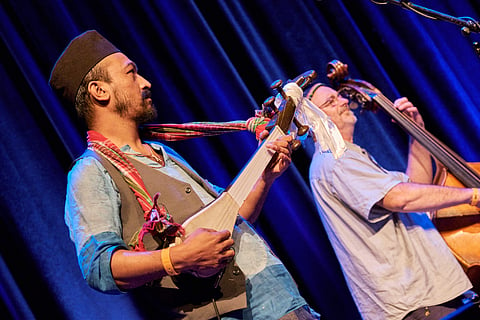
- LIFESTYLE
- FASHION
- FOOD
- ENTERTAINMENT
- EVENTS
- CULTURE
- VIDEOS
- WEB STORIES
- GALLERIES
- GADGETS
- CAR & BIKE
- SOCIETY
- TRAVEL
- NORTH EAST
- INDULGE CONNECT

A CHANCE encounter with baul music in 2009 compelled Matt Keegan, an Australian saxophonist, to form his band, The Three Seas. Thus came on board Raju Das Baul, the lead singer and virtuoso khamak player, percussionist and dubki expert Gaurab Chatterjee, multi-instrumentalist of Nepalese-Indian heritage Deoashish Mothey, and award-winning jazz bassist Steve Elphick. Together, they create a melodious cocktail of Bengali folk and Australian jazz. On a six-city India tour, the cross-cultural band mesmerised the audience with their latest recording, Fathers, Sons & Brothers, at Rabindra Tirtha a u d i t o r i u m . E x c e r p t s f r o m the interview:
When and how did the idea of The Three Seas take shape?
I was invited to India by a family friend, who let me stay at her place in Santiniketan, where I first came into contact with baul music. I became fascinated by the sounds and the instruments. I met and performed with Gaurab, Raju and Deoashish, who made the biggest impression on me, and I thought that we could make some interesting music together with some colleagues from Australia.
What were the challenges? Did you ever feel like giving up on the project, as it took time for the band to form?
There have been a few times when I felt frustrated. However, there is something special about this project that just would not allow me to let it go. I’ve always felt strongly about the concept of the band. Luckily, over the years, we gained the support of a few key people, who provided encouragement at important moments in the band’s career. As the years roll by, we are really starting to gain some positive momentum.
What is the core strength of the band?
One of the great strengths of this band is its diversity. Raju Das brings his beautiful baul songs and amazing khamak. Gaurab Chatterjee brings his experience as a rock drummer and his fantastic dubki, the folk hand drum used in baul. Deoashish Mothey has been rightly described as a ‘little orchestra’, and not only does he sing in Hindi, English and Nepali but also plays esraj, dotora, guitar and machunga with élan. Further, Steve Elphick brought more versatility with the double bass and my baritone saxophone blended gently to provide a wonderful sonic contrast to the Indian instruments.
Is baul the only Indian musical genre that you have collaborated with?
No. Deoashish and Gaurab both bring elements of other Indian musical traditions to the table.
Other musicians like Cheick Tidiane Seck and Sam Mills have also worked on similar projects earlier. How are you different?
There are so many fantastic collaborations happening around the world these days that I find it very inspiring! I believe, a point of difference in our music is the diverse contributions from the individual musicians in the band, and the way we support each other. That makes this project unique.
Tell us about your latest album — Fathers, Sons & Brothers.
Fathers, Sons & Brothers, our second album, was recorded in Sydney on our first tour of Australia in 2017. The music reflects the diverse nature of the band. The title track was composed by our drummer, Gaurab Chatterjee. I contributed three original compositions, while we also play two traditional baul songs by Raju Das. Deoashish brought an arrangement of a Carnatic song, a Nepali song and rap in Hindi.
Tell us about other future projects that you are working on?
I have been working with a sampler, and also with saxophone digital FX. So, I combined these two passions of mine with a live drummer to create a dynamic duo I call ‘K2’. It has been a really fun journey, exploring this different side of my musical personality.